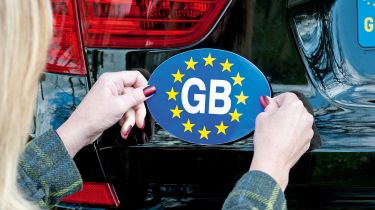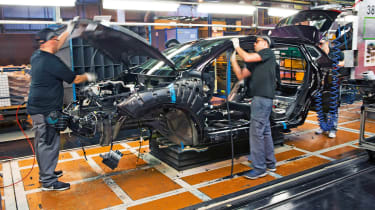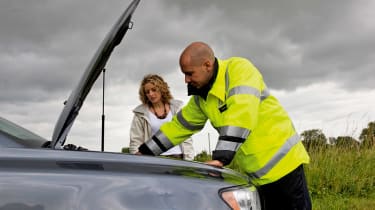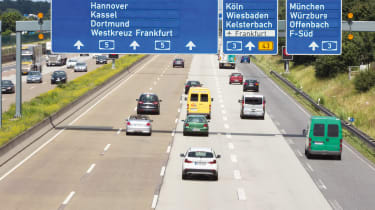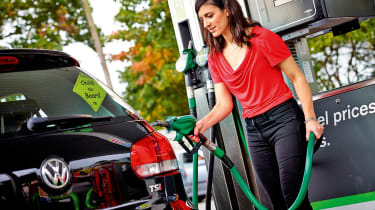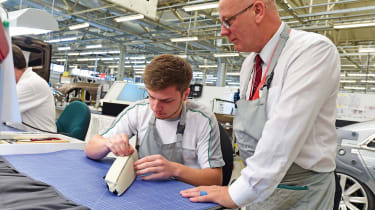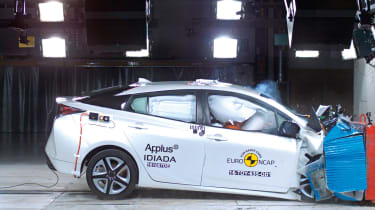Brexit! What it means for cars, motorists and the UK car industry
We look at how the Brexit vote and the UK's departure from the EU impacts everything from new car prices to jobs and car insurance
With less than two years to secure a trade deal with the European Union, Britain's carmakers are facing the "most significant threat in a generation". According to the Society of Motor Manufacturers and Traders (SMMT), an unfavourable trade agreement would put the UK automotive sector at an "immediate competitive disadvantage" and increase new car prices by an average of £1,500.
On 29 March 2017, Prime Minister Theresa May signed Article 50, beginning the formal process of withdrawing the UK from the European Union, and launched the two-year countdown to conclude Brexit negotiations with the EU. The SMMT has said the car industry has to be at the centre of the negotiations.
• VED road tax: everything you need to know
The industry body warned that the £72 billion car manufacturing sector that employs 800,000 people in the UK would be in jeopardy were the UK to not achieve a free-trade deal with the EU bloc after Brexit.
If the UK were to fall back to World Trade Organisation (WTO) tariffs, cars imported and exported to and from the UK would be hit with a 10 per cent charge, while parts vital to car production would be charged a 4.5 per cent levy.
The SMMT estimates the tariffs would add £1.7 billion to the cost of fully assembled cars exported from the UK and £2.7 billion to those imported from the EU. It said the average price of new cars could go up by £1,500. However, figures from consultancy PA Consultancy estimated the price hike could be as high as £2,372.
• Driverless cars: everything you need to know
Mike Hawes, SMMT Chief Executive said: “Triggering Article 50 has started a race against time to secure a deal that safeguards the future of the UK automotive industry. Government has committed to creating and supporting the right conditions for our industry to be successful.
“That means certainty in our relationship with our biggest market, tariff-free and open borders so products, parts and investment can flow freely, and continued influence over the regulation that governs the vehicles we build and drive. We will continue to work with government and our European counterparts but no deal is not an option. Now is the time for Government to deliver.”
Of course, the car imports and UK car manufacturing are just two of the areas in the automotive space that will be impacted by Brexit. Below we've picked out the key Brexit issues that are likely to affect car owners, car drivers and car buyers in the UK.
Brexit and cars: the 10 key automotive areas affected
Car insurance costs
Much of the UK's insurance law is based on EU laws and leaving the EU has put the insurance industry on edge, with uncertainty on what laws would apply and the potential inability of non-UK insurers to operate, increasing prices from providers based here.
Graeme Trudgill, executive director at British Insurance Brokers’ Association, said it was unclear if the Motor Insurance Directive would still apply in the UK following Brexit.
The directive dictates a minimum level of insurance protection in every EU country. If the UK was no longer bound by it, there would be requirements for extra cover when travelling abroad.
Much of the UK motor insurance market originates from Gibraltar, too, so competition could be reduced, with insurers based abroad unable to “passport” into the UK from the EU. This could lead to higher premiums.
Car manufacturing and trade
UK car production and subsequent exports are riding the crest of a wave, and damage to this industry is one of the biggest concerns that car manufacturers face when we pull out of the European Union.
Since 2013, £8billion has been invested in automotive operations around the country as the UK took advantage of being part of the largest single market in the world.
Around 800,000 people are employed in British automotive sector, with more than 80 per cent of UK vehicles exported to over 100 countries – half to the EU. The supply chain for parts and materials is also dependent on the EU, with 63 per cent of UK supply spend sourced abroad.
Disruption to this trading line is of great concern to many in the industry and explains why big manufacturers and SMMT members are against leaving without retaining access to the single market. The SMMT has warned that new car prices could go up by £1,500 if the UK were not to obtain a free-trade deal with the EU bloc.
For the consumer, the EU single market means there are 350 different vehicle ranges available in the UK – over three- quarters of new cars registered in the UK in 2014 were imported from Europe.
Car prices
New car prices will depend heavily on the type of trade agreement the UK achieves with the European Union. If the UK faces the World Trade Organisation (WTO) tariffs - applicable to countries outside the EU with no trade agreement with the bloc - cars exported and imported will face a 10 per cent tariff, while parts will face a 4.5 per cent fee.
The SMMT estimates this would increase average car prices by £1,500, although other sources say the price increase from WTO tariffs could be as high as £2,372.
Though new car prices are at risk, the used market is less likely to be affected, according to Philip Nothard, CAP HPI consumer and retail editor.
Uncertainty over what may happen to the overall economy is the only real threat to costs, with dealers tweaking prices in the short term to protect against any economic slowdown.
Driving abroad
Travel body ABTA has said foreign travel could become more expensive when the UK leaves if new taxes on travel businesses are introduced. But it’s unlikely travel would be too tough for Brits as UK holidaymakers spent almost £20billion in EU countries in 2014 – many of them as motorists.
The UK is already outside the Schengen Area where people can move freely without passports, but upon leaving the EU, new terms will have to be negotiated, and UK citizens driving abroad may need their passports stamped at border crossings.
There’s also the EU Package Travel Directive, which protects against issues such as a package holiday organiser going bust. Leaving the EU will likely nullify this, but the UK has its own ATOL scheme which already operates above EU legislation.
Car breakdowns
Last year, the RAC has launched its new comprehensive European breakdown cover, offering protection in 48 countries for nine passengers and up to £1,000 towards garage labour costs. Luckily, it doesn’t expect EU-wide breakdown cover to be affected if the UK should leave.
The AA backs that up, too. A spokesman told us: "The European motoring organisations have long worked closely together to deal with breakdowns in each other’s countries.”
• Most reliable cars on sale right now
Even after the UK has left the EU, British rescuers won’t leave you stranded at the roadside.
Driving licences
It’s unlikely driving licensing will be hugely affected for those travelling abroad, as bilateral agreements already exist for a host of countries outside the EU.
This means that a UK licence is still valid to drive on for a year before it needs to be exchanged. Even with those countries not in the agreement, you can still drive on your licence for a year, but then you have to take a new test.
The only issue with UK driving licences is for UK nationals living abroad. Currently, they don’t need to exchange their driving licence at all, but it may be the case they’ll have to exchange it after 12 months and apply for a new one, just like with non-EU countries.
Car emissions
Although emissions are governed by EU legislation, it won't be the case that the UK will have it's own legislation once outside the EU.
Regulations will likely remain unchanged as UK makers will still have to meet EU rules to sell in Europe, while we’ll have to accept cars complying with EU rules to drive here.
Car makers on the continent wouldn’t want to adapt vehicles to meet different UK requirements, either – and if they were forced to, purchase prices would rocket.
Greg Archer, clean vehicles manager at campaign group Transport & Environment, added: “The UK negotiated an exception for Jaguar Land Rover from fuel efficiency requirements – this wouldn’t happen in the future. We are either in the EU influencing the rules; or outside accepting a system designed by others.”
Fuel prices
Petrol and diesel prices may not be affected as much as motorists may expect, according to both the AA and RAC. Both organisations agree that Brexit could likely add between 2p and 4p a litre, but this is merely based on the expected weakening of the pound following the vote. If a free-trade agreement is agreed there should be no reason for fuel prices to rise on the basis of Brexit.
The AA explained the price of fuel is, to some degree, dependent on the sterling and US dollar exchange rate. Both oil and fuel in commodity markets are traded in dollars.
• Motorists could face fule duty hike in wake of Brexit
At the moment, a tonne of petrol coming into the UK costs around $500. With the pound currently worth $1.44, the cost of petrol translates into 26.2p a litre.
The RAC supported the link between fuel prices and the exchange rate, and added that the greater influence remains the oil price.
Car industry jobs
There’s a well-documented skills gap in the UK, and although millions of pounds are being poured into domestic training, homegrown talent needs supplementing.
• Best of British: special features
The SMMT has previously said that free movement of workers in the EU is vital to spreading best practice. With the UK leaving the EU, it's no surprise seeing the Government investing more into higher education and research and development. Chancellor Philip Hammond recently announced a £270 million to keep Britain at the forefront of "disruptive technology."
Car safety
The UK sees itself at the forefront of road safety, battling over many years to bring down the number of people killed or seriously injured on our roads.
Part of that is to make cars as safe as they can be via Euro NCAP safety tests and ratings, and despite its name, this wouldn’t change if the UK votes out.
There’s nothing in the constitution that restricts Euro NCAP to EU members, while the word Euro purely identifies a geographical area. Most current UK vehicle safety regulations are based on the Geneva Convention on Road Traffic, and many countries not connected to the EU are still signed up. Vehicle type approval is already country specific to comply with our own Road Traffic Act, too.
One area of concern for the Brexit is the loss of the European Block Exemption ruling, which allows owners to get cars serviced outside of the main dealer network without voiding a warranty.
Thatcham Research chief executive Peter Shaw said: “There is a view that any loss of the European Block Exemption rulings could reduce dealer competition, with parts’ costs potentially increasing. Unfortunately, when price pressure is brought to the new car buying decision, it’s often the safety options that are discarded first.”
How do you think the UK automotive sector will fare after Brexit? Tell us in the comments below...
Find a car with the experts
